人教版八年级下册 unit 10 单元复习知识点课件(共40张PPT)
文档属性
| 名称 | 人教版八年级下册 unit 10 单元复习知识点课件(共40张PPT) | 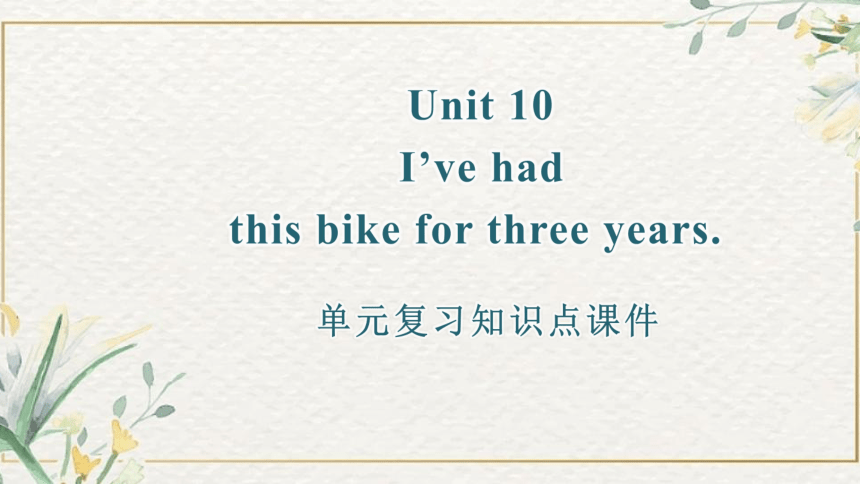 | |
| 格式 | pptx | ||
| 文件大小 | 311.3KB | ||
| 资源类型 | 教案 | ||
| 版本资源 | 人教新目标(Go for it)版 | ||
| 科目 | 英语 | ||
| 更新时间 | 2023-06-11 21:05:33 | ||
图片预览

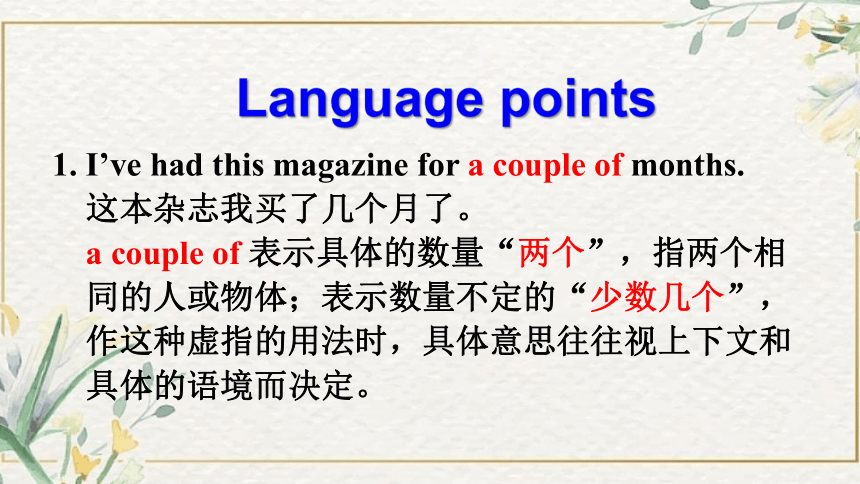
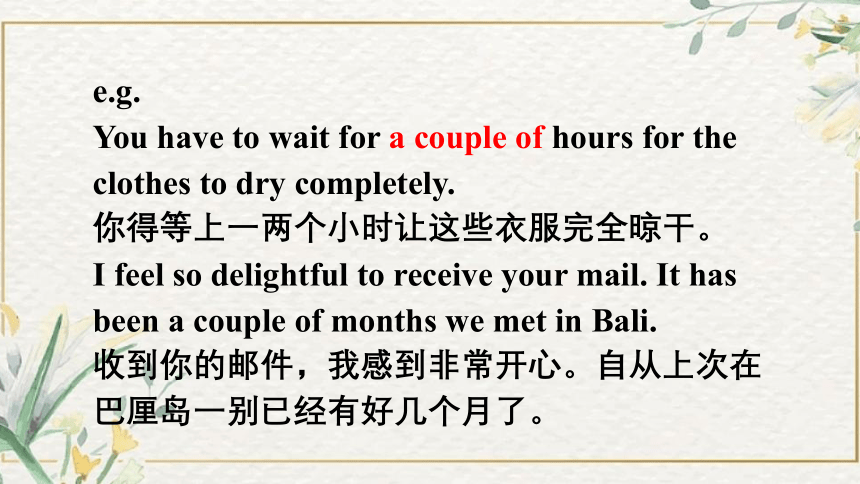
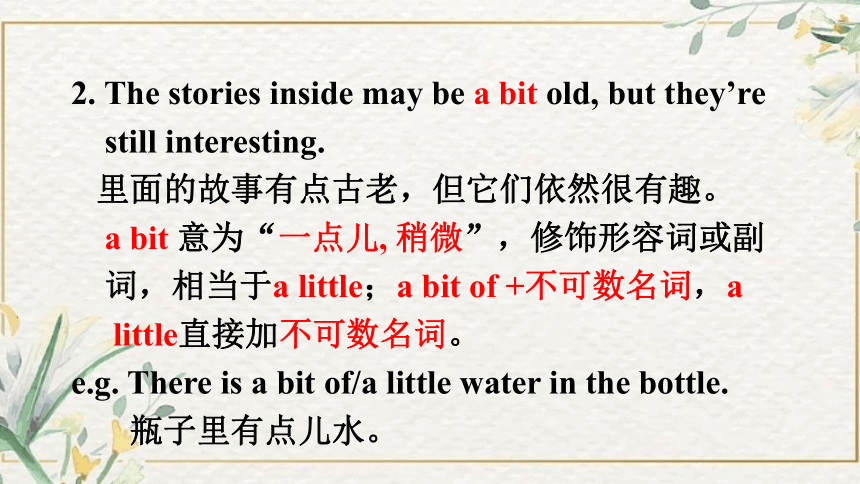
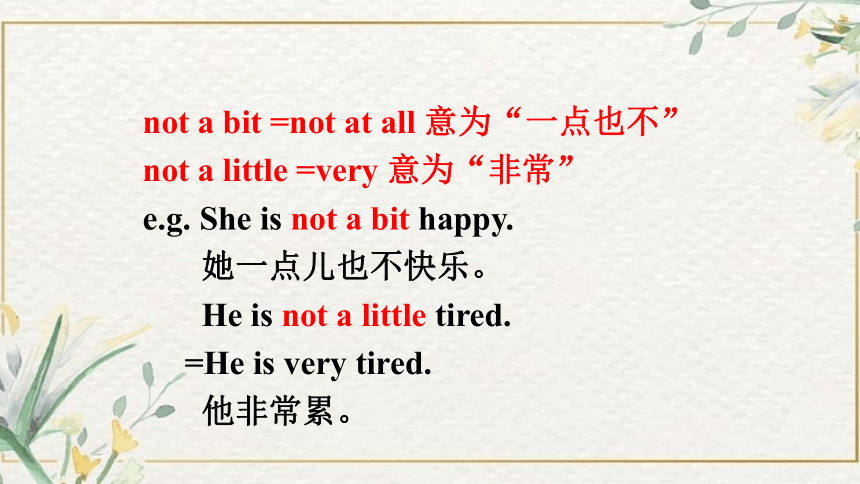
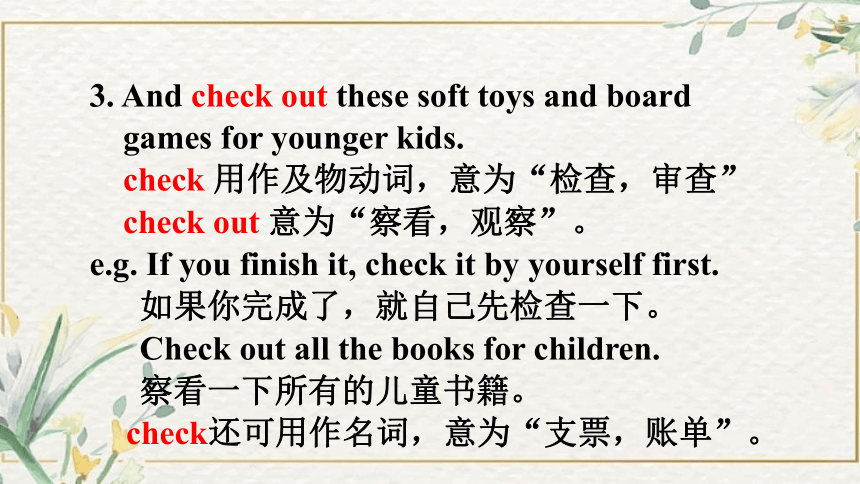
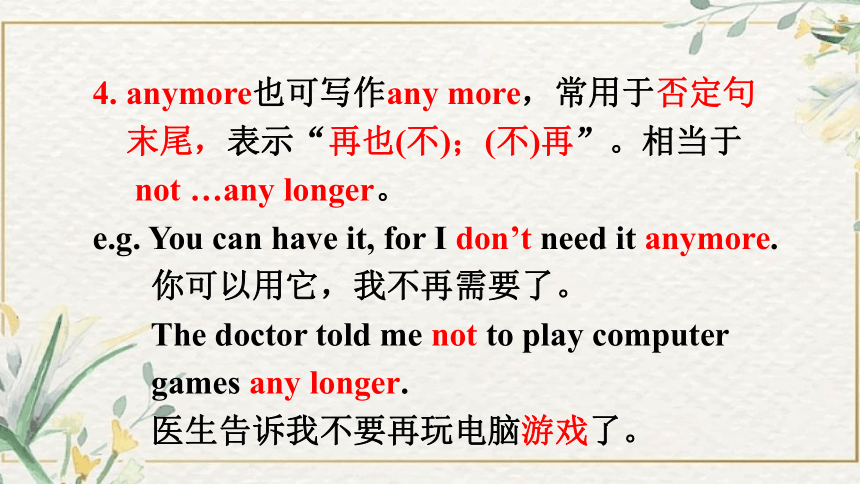
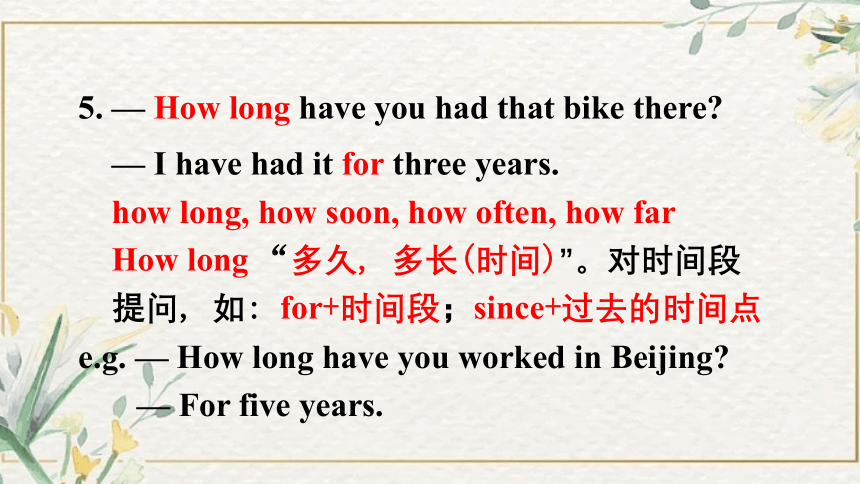
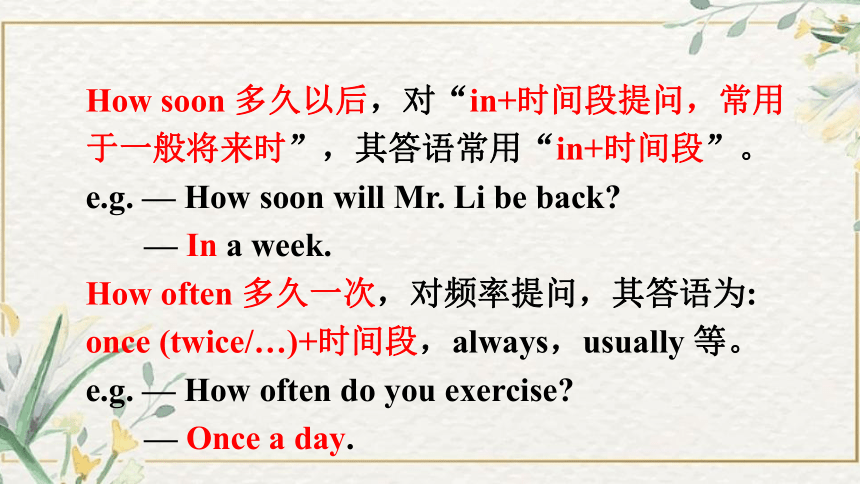
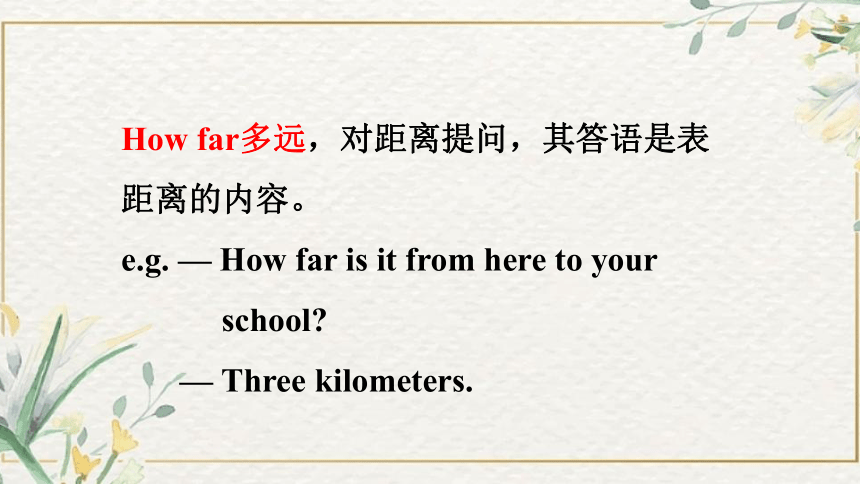
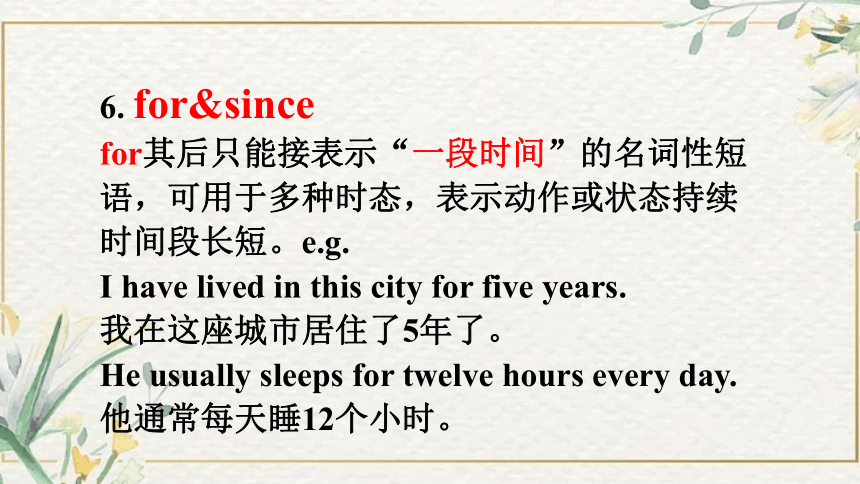
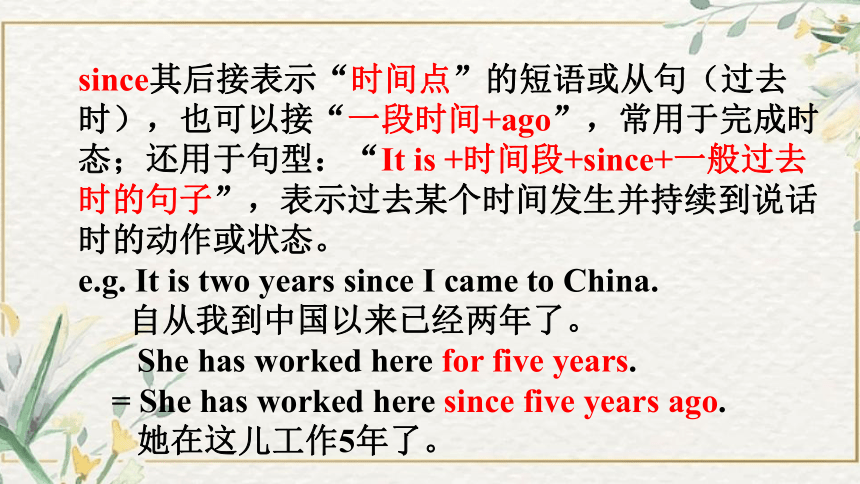
文档简介
(共40张PPT)
单元复习知识点课件
Unit 10
I’ve had
this bike for three years.
1. I’ve had this magazine for a couple of months.
这本杂志我买了几个月了。
a couple of 表示具体的数量“两个”,指两个相
同的人或物体;表示数量不定的“少数几个”,
作这种虚指的用法时,具体意思往往视上下文和
具体的语境而决定。
Language points
e.g.
You have to wait for a couple of hours for the
clothes to dry completely.
你得等上一两个小时让这些衣服完全晾干。
I feel so delightful to receive your mail. It has
been a couple of months we met in Bali.
收到你的邮件,我感到非常开心。自从上次在
巴厘岛一别已经有好几个月了。
2. The stories inside may be a bit old, but they’re
still interesting.
里面的故事有点古老,但它们依然很有趣。
a bit 意为“一点儿, 稍微”,修饰形容词或副
词,相当于a little;a bit of +不可数名词,a
little直接加不可数名词。
e.g. There is a bit of/a little water in the bottle.
瓶子里有点儿水。
not a bit =not at all 意为“一点也不”
not a little =very 意为“非常”
e.g. She is not a bit happy.
她一点儿也不快乐。
He is not a little tired.
=He is very tired.
他非常累。
3. And check out these soft toys and board
games for younger kids.
check 用作及物动词,意为“检查,审查”
check out 意为“察看,观察”。
e.g. If you finish it, check it by yourself first.
如果你完成了,就自己先检查一下。
Check out all the books for children.
察看一下所有的儿童书籍。
check还可用作名词,意为“支票,账单”。
4. anymore也可写作any more,常用于否定句
末尾,表示“再也(不);(不)再”。相当于
not …any longer。
e.g. You can have it, for I don’t need it anymore.
你可以用它,我不再需要了。
The doctor told me not to play computer
games any longer.
医生告诉我不要再玩电脑游戏了。
5. — How long have you had that bike there
— I have had it for three years.
how long, how soon, how often, how far
How long “多久, 多长(时间)”。对时间段
提问, 如: for+时间段;since+过去的时间点
e.g. — How long have you worked in Beijing
— For five years.
How soon 多久以后,对“in+时间段提问,常用于一般将来时”,其答语常用“in+时间段”。
e.g. — How soon will Mr. Li be back
— In a week.
How often 多久一次,对频率提问,其答语为:
once (twice/…)+时间段,always,usually 等。
e.g. — How often do you exercise
— Once a day.
How far多远,对距离提问,其答语是表距离的内容。
e.g. — How far is it from here to your
school
— Three kilometers.
6. for&since
for其后只能接表示“一段时间”的名词性短
语,可用于多种时态,表示动作或状态持续
时间段长短。e.g.
I have lived in this city for five years.
我在这座城市居住了5年了。
He usually sleeps for twelve hours every day.
他通常每天睡12个小时。
since其后接表示“时间点”的短语或从句(过去时),也可以接“一段时间+ago”,常用于完成时态;还用于句型:“It is +时间段+since+一般过去时的句子”,表示过去某个时间发生并持续到说话时的动作或状态。
e.g. It is two years since I came to China.
自从我到中国以来已经两年了。
She has worked here for five years.
= She has worked here since five years ago.
她在这儿工作5年了。
7. Jeff’s family is having a yard sale.
sale用作名词,意为“出售,销售”。on sale
意为“出售,上市”;for sale意为“待售,供
出售”,尤指从主人手里出售。
e.g. Chickens are on sale in the market.
小鸡在市场上出售。
I’m sorry, it’s not for sale. 抱歉,它不出售。
8. Amy thinks it’s hard to sell her old things.
艾米认为卖掉她的旧东西很难。
It’s +adj. (+for sb.) to do sth.意为“(对某人来说)做某事是……的”,it 是形式主语,
真正主语是后面的动词不定式。
e.g.
It’s important for us to learn English well.
学好英语对于我们来说是很重要的。
9. Amy wants to keep her old things because they bring back sweet memories.
艾米想保留她的旧东西,因为它们勾起她的甜蜜回忆。
memory 作名词意为“记忆;回忆”,复数形式为memories,动词为memorize,意为“记忆,背诵”。
e.g. She has a good memory. 她记忆力好。
10. We have already cleared out a lot of things
from our bedrooms.
我们已经从卧室里清理出很多东西了。
clear v. 清理;清除
clear out 清理;丢掉
e.g. I’ll clear out that closet for you.
我要替你把那个小衣橱清理出来。
11. We have decided to each sell five things that
we no longer use.
我们决定每人出售五件不再使用的物品。
(1)此句中we no longer use是由that引导的定语
从句,修饰前面的名词five things。
(2)句中no longer的意思是“不再;不复”,
有时可用not ... any longer或not ... Anymore
替换。
e.g. He no longer lives here.
(= He doesn’t live here anymore / anylonger.)
他不再住这儿了。
3) each在句中对we进行限定,表示“(两个或两
个以上的人或物中)各自;每个”。
e.g. My sister and I each have an English-Chinese
dictionary.
我和姐姐各有一本英汉词典。
12. My daughter was more understanding, although she also felt sad to part with certain toys.
1) certain adj. 意为“某种;某事;某人”
e.g. He decided to sell his certain books.
他决定卖掉他的某些书籍。
[拓展] certain adj. 意为“确实的,无疑的”
常用结构:
be certain to do sth. 肯定要做某事
be certain of/about sth. 对某事确定、有把握
be certain of doing sth. 有把握做某事
be certain +从句 一定……
e.g. He felt quite certain of success.
他对成功很有把握。
2) part with “放弃、交出” part v. “离开,分开”
e.g. Don’t part with your dream.
不要放弃你的梦想。
13. As for me, I did not want to give up my football shirts, but, to be honest, I have not played for a while now.
1) as for 至于、关于
e.g. And as for us, we are fortunate.
对我们来说,我们是幸运的。
2) to be honest意为“说实在的,说实话”,经常单独使用,作插入语,用逗号与句子隔开。类似的表达还有to tell the truth “老实说,说实话”。
e.g. To be honest, she is not an honest girl.
说实话,她不是一个诚实的女孩。
honest为形容词, 意为“诚实的;老实的”
反义词为dishonest 不诚实的。
e.g. An honest man does not tell lies.
诚实的人不说谎。
3) while n. “一段时间,一会儿”
while还可用作连词,引导时间状语从句,意为“当……的时候”,while引导的时间状语从句中的动词必须是延续性动词。e.g.
They chatted away happily for a while.
他们高兴地闲聊了一会儿。
He kept in touch with us while he was on vacation.
他在度假期间仍与我们保持联系。
14.Even though it’s old, it’s full of interesting places to see and things to do.
1) even though和even if两者均可用于引导让步状语从句,其细微区别是:even if引导的从句往往是假设性的,相当于汉语的“即使”“纵然”“就算”“哪怕”。even though引导的从句内容往往是真实的,主要用于引出不利于主句情况的信息,相当于汉语的“尽管”“虽然”。 不过,在实际语言运用中,even if与even though有时也可不加区别地混用。
即使明天下雨,我们也决不改变计划。
Even if it rains tomorrow, we won’t change our plan.
他尽管经验最少,但教得最好。
He’s the best teacher even though he has the least experience.
尽管她嘲笑他,他还是很喜欢她。
Even if / Even though she laughs at him, he likes her.
虽然我们已尽了最大的力量,但还是输了。
Although/Though/Even though we all tried our best, we lost the game.
我们输了,然而我们已尽了最大的力量。
We lost the game although/though/even though we tried our best.
2) although和(even) though均可用于句首或从句之首。though多用于非正式文体中,较为通俗。
3) be full of = be filled with 充满,装满
瓶子里装满了水。
The bottle is filled with water.
满屋浓烟。
The room is filled with heavy smoke.
香槟酒有很多气泡。
Champagne (香槟酒) is full of bubbles (气泡).
15. Yes, that’s one of the oldest buildings in
this town.
one of the + 形容词最高级 + 名词复数 + 表示范围的短语或从句, 表示“最……之一”。
中国是世界上最大的国家之一。
China is one of the largest countries in the world.
当教师最重要的一个品性就是要有耐心。
Patience is one of the most important attributes in a teacher.
16. It’s been around for as long as I can remember.
as … as … 意为“和……一样”,表示同级的比较。
其基本用法为:“as + adj. / adv. + as …”。
其否定式为: “not as + adj. / adv. + as … ”。
他英语说的和你一样流利。
He speaks English as fluently as you.
这部字典不如你想象的那样有用。
This dictionary is not as useful as you think it is.
17. It’s been around for at least 20 years.
at least “至少”
我至少在十岁以前一直怕狗。
I was afraid of dogs until I was at least ten.
停电时我们至少可以使用蜡烛。
At least we can use candles if the electricity fails.
search作不及物动词时,意为“搜索;搜查”。
search for意为“搜寻,找寻”。
e.g. He is searching for his sunglasses.
他正在找他的太阳镜。
【拓展】作及物动词,意为“在······搜查”或“搜查”。
e.g. They searched the forest for the lost child.
他们在森林里寻找那个走失的小孩。
18. Nowadays, millions of Chinese leave the countryside to search for work in the cities.
among prep. 在三者或三者以上之间
e.g. Tom sits among the students.
汤姆坐在学生之间。
between prep. 在两者之间
e.g. Tom sits between Mary and Frank.
汤姆坐在玛丽和弗兰克之间。
among与between
19. Among these is Zhang Wei, a 46-year-old
husband and father.
a 46-year-old husband and father意为“一位46岁的丈夫和父亲”,46-year-old是一个复合形容词,特点“一是数词、名词、形容词之间要用连字符连接,二是数词后的名词用单数形式”。e.g.
Tom is a 10-year-old boy. = Tom is a boy of 10 years old.
汤姆是一个10岁的男孩。
Lily is an 8-year-old girl.
莉莉是一个8岁的女孩。
【拓展】
另一种类似的复合形容词作定语的结构是:
数词+连字符+名词,或数词+名词的所有格。
e.g. a two-month holiday = a two months’
holiday 一个为期两个月的假期。
ten-minute walk/drive/ride =
ten minutes’ walk/drive/ride
步行/开车/骑车10分钟的路程
shame不可数名词,意为“羞耻;羞愧;惭愧” 。
e.g. It’s a shame (that) you can’t stay for dinner.
你不能留下来吃晚饭,真遗憾。
【拓展】相关短语:
to one’s shame “令人感到羞愧的是”
feel shame at … “因······而感到羞愧”
in shame “羞愧的”
have no shame “无羞耻心”
20. …It’s a shame, but I just don’t have the time,…
regard及物动词,意为“将······认为;把······视为”。
常用短语regard…as…意为“将······视为······;把······当做······” ,as为介词,其后接名词或代词。
e.g. I regard you as my best friend.
我把你当做我最好的朋友。
We regard him as our brother.
我们把他当成兄弟看待。
21. Many people like Zhong Wei regard with great interest how their hometowns have changed.
century,可数名词,意为“世纪;百年”,
其复数形式为centuries。
e.g. the mid-20th century 20世纪中期
an eighteenth-century writer
一名18世纪的作家
A hundred years is a century.
一百年是一个世纪。
22. Children have learned to read and count at my old primary school since the mid-20th century.
according to意为“依照,按照”,to为介词,
后接名词、代词或从句。
e.g.
He divided them into three groups according to age.
他把他们按年龄分成三组。
23. According to Zhong Wei, however, some things will never change.
24. consider动词,意为“考虑”,=think about,后跟名词、代词、动名词、宾语从句或“疑问词+不定式”。
e.g. Please consider my suggestion.
请考虑我的建议。
I am considering changing my job.
我正在考虑换份工作。
He has never considered how to solve that problem.
他从未考虑过如何解决那个问题。
【拓展】
在与动词连用时,只能用动名词形式的动词或短语有:
consider 考虑 enjoy 喜爱 practice 练习
keep (on) 继续(一直) mind 介意
finish 完成 have fun 高兴 feel like 想要
look forward to 盼望
can’t help 禁不住 give up 放弃
歌诀:喜欢错过别介意,
完成愉快勤练习,
禁不住考虑想放弃
单元复习知识点课件
Unit 10
I’ve had
this bike for three years.
1. I’ve had this magazine for a couple of months.
这本杂志我买了几个月了。
a couple of 表示具体的数量“两个”,指两个相
同的人或物体;表示数量不定的“少数几个”,
作这种虚指的用法时,具体意思往往视上下文和
具体的语境而决定。
Language points
e.g.
You have to wait for a couple of hours for the
clothes to dry completely.
你得等上一两个小时让这些衣服完全晾干。
I feel so delightful to receive your mail. It has
been a couple of months we met in Bali.
收到你的邮件,我感到非常开心。自从上次在
巴厘岛一别已经有好几个月了。
2. The stories inside may be a bit old, but they’re
still interesting.
里面的故事有点古老,但它们依然很有趣。
a bit 意为“一点儿, 稍微”,修饰形容词或副
词,相当于a little;a bit of +不可数名词,a
little直接加不可数名词。
e.g. There is a bit of/a little water in the bottle.
瓶子里有点儿水。
not a bit =not at all 意为“一点也不”
not a little =very 意为“非常”
e.g. She is not a bit happy.
她一点儿也不快乐。
He is not a little tired.
=He is very tired.
他非常累。
3. And check out these soft toys and board
games for younger kids.
check 用作及物动词,意为“检查,审查”
check out 意为“察看,观察”。
e.g. If you finish it, check it by yourself first.
如果你完成了,就自己先检查一下。
Check out all the books for children.
察看一下所有的儿童书籍。
check还可用作名词,意为“支票,账单”。
4. anymore也可写作any more,常用于否定句
末尾,表示“再也(不);(不)再”。相当于
not …any longer。
e.g. You can have it, for I don’t need it anymore.
你可以用它,我不再需要了。
The doctor told me not to play computer
games any longer.
医生告诉我不要再玩电脑游戏了。
5. — How long have you had that bike there
— I have had it for three years.
how long, how soon, how often, how far
How long “多久, 多长(时间)”。对时间段
提问, 如: for+时间段;since+过去的时间点
e.g. — How long have you worked in Beijing
— For five years.
How soon 多久以后,对“in+时间段提问,常用于一般将来时”,其答语常用“in+时间段”。
e.g. — How soon will Mr. Li be back
— In a week.
How often 多久一次,对频率提问,其答语为:
once (twice/…)+时间段,always,usually 等。
e.g. — How often do you exercise
— Once a day.
How far多远,对距离提问,其答语是表距离的内容。
e.g. — How far is it from here to your
school
— Three kilometers.
6. for&since
for其后只能接表示“一段时间”的名词性短
语,可用于多种时态,表示动作或状态持续
时间段长短。e.g.
I have lived in this city for five years.
我在这座城市居住了5年了。
He usually sleeps for twelve hours every day.
他通常每天睡12个小时。
since其后接表示“时间点”的短语或从句(过去时),也可以接“一段时间+ago”,常用于完成时态;还用于句型:“It is +时间段+since+一般过去时的句子”,表示过去某个时间发生并持续到说话时的动作或状态。
e.g. It is two years since I came to China.
自从我到中国以来已经两年了。
She has worked here for five years.
= She has worked here since five years ago.
她在这儿工作5年了。
7. Jeff’s family is having a yard sale.
sale用作名词,意为“出售,销售”。on sale
意为“出售,上市”;for sale意为“待售,供
出售”,尤指从主人手里出售。
e.g. Chickens are on sale in the market.
小鸡在市场上出售。
I’m sorry, it’s not for sale. 抱歉,它不出售。
8. Amy thinks it’s hard to sell her old things.
艾米认为卖掉她的旧东西很难。
It’s +adj. (+for sb.) to do sth.意为“(对某人来说)做某事是……的”,it 是形式主语,
真正主语是后面的动词不定式。
e.g.
It’s important for us to learn English well.
学好英语对于我们来说是很重要的。
9. Amy wants to keep her old things because they bring back sweet memories.
艾米想保留她的旧东西,因为它们勾起她的甜蜜回忆。
memory 作名词意为“记忆;回忆”,复数形式为memories,动词为memorize,意为“记忆,背诵”。
e.g. She has a good memory. 她记忆力好。
10. We have already cleared out a lot of things
from our bedrooms.
我们已经从卧室里清理出很多东西了。
clear v. 清理;清除
clear out 清理;丢掉
e.g. I’ll clear out that closet for you.
我要替你把那个小衣橱清理出来。
11. We have decided to each sell five things that
we no longer use.
我们决定每人出售五件不再使用的物品。
(1)此句中we no longer use是由that引导的定语
从句,修饰前面的名词five things。
(2)句中no longer的意思是“不再;不复”,
有时可用not ... any longer或not ... Anymore
替换。
e.g. He no longer lives here.
(= He doesn’t live here anymore / anylonger.)
他不再住这儿了。
3) each在句中对we进行限定,表示“(两个或两
个以上的人或物中)各自;每个”。
e.g. My sister and I each have an English-Chinese
dictionary.
我和姐姐各有一本英汉词典。
12. My daughter was more understanding, although she also felt sad to part with certain toys.
1) certain adj. 意为“某种;某事;某人”
e.g. He decided to sell his certain books.
他决定卖掉他的某些书籍。
[拓展] certain adj. 意为“确实的,无疑的”
常用结构:
be certain to do sth. 肯定要做某事
be certain of/about sth. 对某事确定、有把握
be certain of doing sth. 有把握做某事
be certain +从句 一定……
e.g. He felt quite certain of success.
他对成功很有把握。
2) part with “放弃、交出” part v. “离开,分开”
e.g. Don’t part with your dream.
不要放弃你的梦想。
13. As for me, I did not want to give up my football shirts, but, to be honest, I have not played for a while now.
1) as for 至于、关于
e.g. And as for us, we are fortunate.
对我们来说,我们是幸运的。
2) to be honest意为“说实在的,说实话”,经常单独使用,作插入语,用逗号与句子隔开。类似的表达还有to tell the truth “老实说,说实话”。
e.g. To be honest, she is not an honest girl.
说实话,她不是一个诚实的女孩。
honest为形容词, 意为“诚实的;老实的”
反义词为dishonest 不诚实的。
e.g. An honest man does not tell lies.
诚实的人不说谎。
3) while n. “一段时间,一会儿”
while还可用作连词,引导时间状语从句,意为“当……的时候”,while引导的时间状语从句中的动词必须是延续性动词。e.g.
They chatted away happily for a while.
他们高兴地闲聊了一会儿。
He kept in touch with us while he was on vacation.
他在度假期间仍与我们保持联系。
14.Even though it’s old, it’s full of interesting places to see and things to do.
1) even though和even if两者均可用于引导让步状语从句,其细微区别是:even if引导的从句往往是假设性的,相当于汉语的“即使”“纵然”“就算”“哪怕”。even though引导的从句内容往往是真实的,主要用于引出不利于主句情况的信息,相当于汉语的“尽管”“虽然”。 不过,在实际语言运用中,even if与even though有时也可不加区别地混用。
即使明天下雨,我们也决不改变计划。
Even if it rains tomorrow, we won’t change our plan.
他尽管经验最少,但教得最好。
He’s the best teacher even though he has the least experience.
尽管她嘲笑他,他还是很喜欢她。
Even if / Even though she laughs at him, he likes her.
虽然我们已尽了最大的力量,但还是输了。
Although/Though/Even though we all tried our best, we lost the game.
我们输了,然而我们已尽了最大的力量。
We lost the game although/though/even though we tried our best.
2) although和(even) though均可用于句首或从句之首。though多用于非正式文体中,较为通俗。
3) be full of = be filled with 充满,装满
瓶子里装满了水。
The bottle is filled with water.
满屋浓烟。
The room is filled with heavy smoke.
香槟酒有很多气泡。
Champagne (香槟酒) is full of bubbles (气泡).
15. Yes, that’s one of the oldest buildings in
this town.
one of the + 形容词最高级 + 名词复数 + 表示范围的短语或从句, 表示“最……之一”。
中国是世界上最大的国家之一。
China is one of the largest countries in the world.
当教师最重要的一个品性就是要有耐心。
Patience is one of the most important attributes in a teacher.
16. It’s been around for as long as I can remember.
as … as … 意为“和……一样”,表示同级的比较。
其基本用法为:“as + adj. / adv. + as …”。
其否定式为: “not as + adj. / adv. + as … ”。
他英语说的和你一样流利。
He speaks English as fluently as you.
这部字典不如你想象的那样有用。
This dictionary is not as useful as you think it is.
17. It’s been around for at least 20 years.
at least “至少”
我至少在十岁以前一直怕狗。
I was afraid of dogs until I was at least ten.
停电时我们至少可以使用蜡烛。
At least we can use candles if the electricity fails.
search作不及物动词时,意为“搜索;搜查”。
search for意为“搜寻,找寻”。
e.g. He is searching for his sunglasses.
他正在找他的太阳镜。
【拓展】作及物动词,意为“在······搜查”或“搜查”。
e.g. They searched the forest for the lost child.
他们在森林里寻找那个走失的小孩。
18. Nowadays, millions of Chinese leave the countryside to search for work in the cities.
among prep. 在三者或三者以上之间
e.g. Tom sits among the students.
汤姆坐在学生之间。
between prep. 在两者之间
e.g. Tom sits between Mary and Frank.
汤姆坐在玛丽和弗兰克之间。
among与between
19. Among these is Zhang Wei, a 46-year-old
husband and father.
a 46-year-old husband and father意为“一位46岁的丈夫和父亲”,46-year-old是一个复合形容词,特点“一是数词、名词、形容词之间要用连字符连接,二是数词后的名词用单数形式”。e.g.
Tom is a 10-year-old boy. = Tom is a boy of 10 years old.
汤姆是一个10岁的男孩。
Lily is an 8-year-old girl.
莉莉是一个8岁的女孩。
【拓展】
另一种类似的复合形容词作定语的结构是:
数词+连字符+名词,或数词+名词的所有格。
e.g. a two-month holiday = a two months’
holiday 一个为期两个月的假期。
ten-minute walk/drive/ride =
ten minutes’ walk/drive/ride
步行/开车/骑车10分钟的路程
shame不可数名词,意为“羞耻;羞愧;惭愧” 。
e.g. It’s a shame (that) you can’t stay for dinner.
你不能留下来吃晚饭,真遗憾。
【拓展】相关短语:
to one’s shame “令人感到羞愧的是”
feel shame at … “因······而感到羞愧”
in shame “羞愧的”
have no shame “无羞耻心”
20. …It’s a shame, but I just don’t have the time,…
regard及物动词,意为“将······认为;把······视为”。
常用短语regard…as…意为“将······视为······;把······当做······” ,as为介词,其后接名词或代词。
e.g. I regard you as my best friend.
我把你当做我最好的朋友。
We regard him as our brother.
我们把他当成兄弟看待。
21. Many people like Zhong Wei regard with great interest how their hometowns have changed.
century,可数名词,意为“世纪;百年”,
其复数形式为centuries。
e.g. the mid-20th century 20世纪中期
an eighteenth-century writer
一名18世纪的作家
A hundred years is a century.
一百年是一个世纪。
22. Children have learned to read and count at my old primary school since the mid-20th century.
according to意为“依照,按照”,to为介词,
后接名词、代词或从句。
e.g.
He divided them into three groups according to age.
他把他们按年龄分成三组。
23. According to Zhong Wei, however, some things will never change.
24. consider动词,意为“考虑”,=think about,后跟名词、代词、动名词、宾语从句或“疑问词+不定式”。
e.g. Please consider my suggestion.
请考虑我的建议。
I am considering changing my job.
我正在考虑换份工作。
He has never considered how to solve that problem.
他从未考虑过如何解决那个问题。
【拓展】
在与动词连用时,只能用动名词形式的动词或短语有:
consider 考虑 enjoy 喜爱 practice 练习
keep (on) 继续(一直) mind 介意
finish 完成 have fun 高兴 feel like 想要
look forward to 盼望
can’t help 禁不住 give up 放弃
歌诀:喜欢错过别介意,
完成愉快勤练习,
禁不住考虑想放弃
同课章节目录
- Unit 1 What's the matter?
- Section A
- Section B
- Unit 2 I'll help to clean up the city parks.
- Section A
- Section B
- Unit 3 Could you please clean your room?
- Section A
- Section B
- Unit 4 Why don't you talk to your parents?
- Section A
- Section B
- Unit 5 What were you doing when the rainstorm came
- Section A
- Section B
- Review of Units 1-5
- Unit 6 An old man tried to move the mountains.
- Section A
- Section B
- Unit 7 What's the highest mountain in the world?
- Section A
- Section B
- Unit 8 Have you read Treasure Island yet?
- Section A
- Section B
- Unit 9 Have you ever been to a museum?
- Section A
- Section B
- Unit 10 I've had this bike for three years.
- Section A
- Section B
